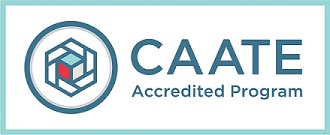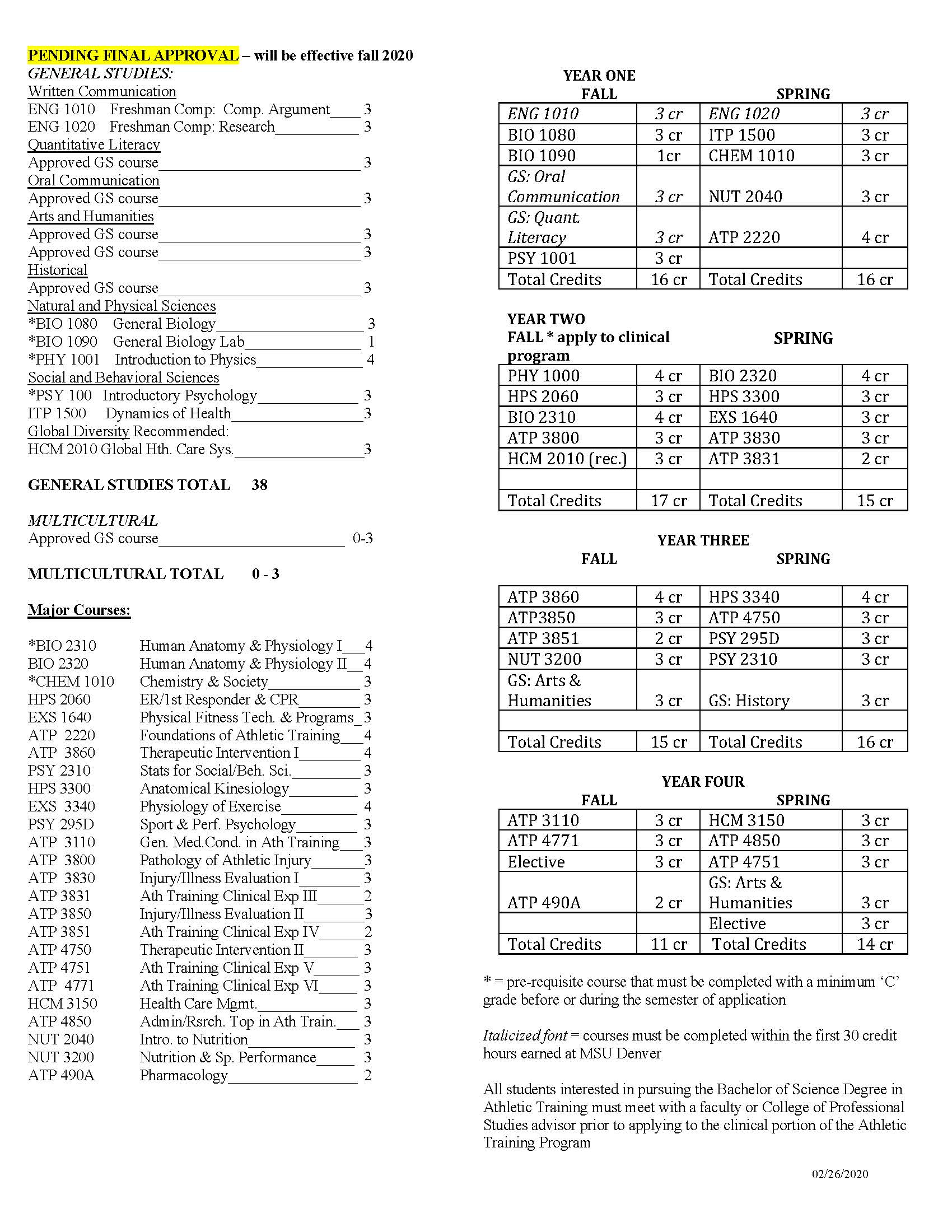Request Information
Ready to find out what MSU Denver can do for you? We’ve got you covered.
The Commission on Accreditation of Athletic Training Education (CAATE) mandates that “CAATE accredited professional athletic training programs must result in the granting of a master’s degree in Athletic Training” with the requirement that institutions cannot enroll an undergraduate cohort after fall 2022. With this being said, and with the COVID-19 pandemic, the MSU Denver Athletic Training Program has made the difficult decision to not accept new undergraduate athletic training students.
The Athletic Training faculty are working diligently to create a rigorous academic program that will prepare students for graduate studies in athletic training as well as physical therapy and occupational therapy. Beginning in fall 2021, students are being encouraged to change their major to Exercise Science and meet with Clare Kost, HPS Department academic advisor and/or an athletic training faculty advisor to discuss their academic and career goals. Students will have access to the courses that CAATE has mandated as prerequisite courses for admittance to master’s level athletic training programs in addition to courses that will introduce them to the many facets of allied health care which will give students a solid foundation as they enter graduate school. These pre-requisite courses are taken as part of the exercise science major, general studies requirements and electives as necessary.
Students who are currently enrolled in the clinical portion of the Athletic Training program (i.e., assigned to a clinical athletic training site and active in the Typhon clinical tracking system) are NOT affected by this change. All current clinical athletic training students will have full support to complete their bachelor’s degree to be qualified to take the national Board of Certification examination.
The Athletic Training Program (ATP) prepares students to fulfill the certification requirements set forth by the Board of Certification, Inc. (BOC) in order to become a Certified Athletic Trainer (ATC).
Certified Athletic Trainers function in cooperative environments with physicians and other allied health care professionals in a variety of settings including:
The Athletic Training Education Program is comprised of intensive theory coursework and extensive clinical education experiences.
Mission:
The professional preparation of athletic training students to be culturally sensitive, evidence-based practitioners who will contribute to the health care needs of a global society.
Program Goal:
The goal of the MSU Denver Athletic Training program is to provide high quality didactic and clinical education for students that prepares them for employment as qualified, competent athletic trainers who, upon graduation, will be able to:
Program Outcome #1:
Students will prove proficiency in all areas related to the educational domains of athletic training.
Measurable student learning objectives:
Program Outcome #2:
Students will communicate effectively (oral and written) with appropriate stakeholders in the athletic training field (e.g.: patients, parents/guardians, health care professionals, etc.)
Measurable student learning objectives:
Program Outcome #3:
Students will find, synthesize and utilize evidence to guide patient care and clinical decision making.
Measurable student objectives:
Program Outcome #4:
Students will be prepared to enter the work force or graduate program as a culturally sensitive athletic trainer.
Measurable Student Learning Objectives:

The Metropolitan State University of Denver’s Athletic Training Program is accredited by the Commission on Accreditation of Athletic Training Education (CAATE). The program has earned full accreditation status of ten years and is accredited through 2019.
For all students enrolling in MSU Denver beginning Fall 2020 or currently majoring in athletic training but have not been formally admitted to the MSU Denver Athletic Training Program, new curriculum and accreditation standards will be implemented in order to maintain compliance with the Commission on Accreditation of Athletic Training Education (CAATE).
The objective of the Athletic Training Program is the professional preparation of athletic training students qualifying them to sit for the Board of Certification (BOC) certification exam. Upon successful completion of the BOC exam, the athletic training graduate may practice as a certified athletic trainer (ATC).
The Athletic Training Program is an extended major within the Department of Human Performance and Sport, which eliminates the need for a minor. Students must meet with either an Athletic Training Faculty advisor or the Human Performance and Sport advisor.
Students interested in pursuing the Athletic Training major must do the following:
> Contact an Athletic Training Program academic or faculty advisor for academic advising and to declare major.
> Complete the following required pre-requisite courses with a grade of “C” or better:
> Earn and maintain a minimum 2.75 Cumulative GPA as well as a minimum 2.75 GPA in all major courses
> Students must apply to the Athletic Training Program during the fall semester with the application being due October 1st. Some pre-requisite courses may be in progress at the time of application, but all pre-requisite courses must be satisfactorily completed at the end of the fall semester of application. Students can request an application via e-mail (https://www.msudenver.edu/hps/contactus/ ) or in-person in the office the Department of Human Performance and Sport: PE Building room 217.
Please note:
> Five semesters are required to complete the Athletic Training Program.
> The five-semester sequence begins only in the spring semester.
> The Athletic Training Program at Metropolitan State University of Denver is a rigorous and intense program that places specific requirements and demands on the student enrolled in the program. An objective of this program is to prepare graduates to enter a variety of employment settings and to render care to a wide spectrum of individuals engaged in physical activity. The technical standards set forth by the Athletic Training Program establish the essential qualities considered necessary for students admitted to this program to achieve the knowledge, skills, and competencies of an entry-level athletic trainer, as well as meet the expectations of The Commission on Accreditation of Athletic Training Education (CAATE). All students admitted to the Athletic Training Program must meet the following abilities and expectations during the entire time period that they are enrolled in the MSU Denver ATP.
Equivalent transfer coursework may be considered. All transfer student coursework will be evaluated individually. Only athletic training coursework completed at institutions accredited by the Commission on Accreditation of Athletic Training Education (CAATE) will be considered for transfer credit into the Athletic Training Program. Transfer credit is not guaranteed.
Students must maintain a cumulative GPA of 2.75 or higher, and a major GPA of 2.75 or higher. If either GPA falls below the minimum, one of the following will occur:
Students enrolled and active in the formal clinical sequence of the Athletic Training Program must maintain the following throughout the required six semesters:
Candidates for continuation in the Athletic Training Program must demonstrate the following Athletic Training Program technical standards as required by the CAATE:
The Athletic Training Program is an extended major, so Athletic Training students are not required to complete a minor.
If your catalog year is not 2019-2020, you will want to visit the University Catalog for an accurate listing of major requirements specific for your catalog year. You may also visit the Catalog to learn more about the program, course prerequisites, and other degree requirements. The University Catalog can be found HERE.

Carrie Meyer, EdD, LAT, ATC – [email protected]
Stephanie Uszacki, MS, LAT, ATC – [email protected]
Corey Andrews, MEd, LAT, ATC, PES – [email protected]
Email: [email protected] l Phone: 303-615-1818
Department of Exercise and Sport SciencesMain Office Location:
Physical Education/Event Center (PE) 217
Mailing Address:
PO Box 173362
Campus Box 25
Denver, CO 80202